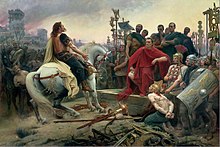Versingetoriksi
Vercingetorix (rreth 82 p.e.s. – 46 p. e. s.) ishte një prijës i fisit Arverni i cili arriti ti bashkonte të gjithë Galët në një revoltë kundër forcave pushtuese romake të Jul Cezarit.




Biografia
RedaktoVersingetoriksi erdhi në pushtet pas kurorëzimit formal të tij si udhëheqës i fisit Arverni në Bibracte në vitin 52 p.e.s. Ai menjëherë krijoi një aleancë me fiset tjera galike, mori komandën e përgjithshme dhe të gjitha forcat në Gali i udhëhoqi në një revoltë kundër pushtetit romak. Ai fitoi në Betejën e Gergovias, në të cilën 46 centurion dhe 700 legjionar romak gjetën vdekjen dhe më shumë se 6,000 njerëz u plagosën. Pas kësaj beteje legjionet romake të Cezarit u tërhoqën.
Megjithatë, Cezari ia doli të shfrytëzonte përqarjet e brendshme të fiseve gale. Versingetoriksi bëri edhe një përpjekje të bashkonte galët kundër pushtimit romak mirëpo kjo përpjekje dështoi sepse ishte shumë e vonuar.[1][2] Në Betejën e Alesias, romakët i rrethuan dhe i mundën forcat e tij dhe të robërve të tij. Ai u mbajt i burgosur për pesë vjet. Në vitin 46 p.e.s. si pjesë e promovimit triumfal të Cezarit, Versingetoriksin e lidhur e ekspozuan nëpër rrugët e Romës dhe pastaj me urdhër të Cezarit, Versingetoriksi u ekzekutua. [3] [4]
Shih edhe
RedaktoLidhje tё jashtme
Redakto- A reconstructed portrait of Vercingetorix, based on historical sources, in a contemporary style.
- Curchin, Leonard A. Lingua Gallica (The Gaulish Language). Retrieved January 23, 2010 from Uwaterloo.ca
- Paul Marius Martin, Vercingétorix : le politique, le stratège. Paris : Perrin, 2000, 260 p. ISBN 2-262-01691-7.
Referime
RedaktoReferime
Redakto- ^ "France: The Roman conquest". Encyclopædia Britannica Online. Encyclopædia Britannica. Marrë më 6 prill 2015.
Because of chronic internal rivalries, Gallic resistance was easily broken, though Vercingetorix's Great Rebellion of 52 bce had notable successes.
{{cite web}}: Mungon ose është bosh parametri|language=(Ndihmë!) - ^ "Julius Caesar: The first triumvirate and the conquest of Gaul". Encyclopædia Britannica Online. Encyclopædia Britannica. Marrë më 15 shkurt 2015.
Indeed, the Gallic cavalry was probably superior to the Roman, horseman for horseman. Rome's military superiority lay in its mastery of strategy, tactics, discipline, and military engineering. In Gaul, Rome also had the advantage of being able to deal separately with dozens of relatively small, independent, and uncooperative states. Caesar conquered these piecemeal, and the concerted attempt made by a number of them in 52 bce to shake off the Roman yoke came too late.
{{cite web}}: Mungon ose është bosh parametri|language=(Ndihmë!) - ^ Dietler, Michael, "Our ancestors the Gauls": archaeology, ethnic nationalism, and the manipulation of Celtic identity in modern Europe Arkivuar 4 mars 2016 tek Wayback Machine (7.3M), American Anthropologist, 1994, 96: 584-605.
- ^ Dietler, M., A tale of three sites: the monumentalization of Celtic oppida and the politics of collective memory and identity, World Archaeology, 1998, 30: 72-89.